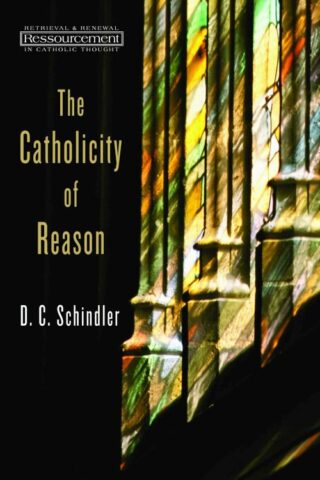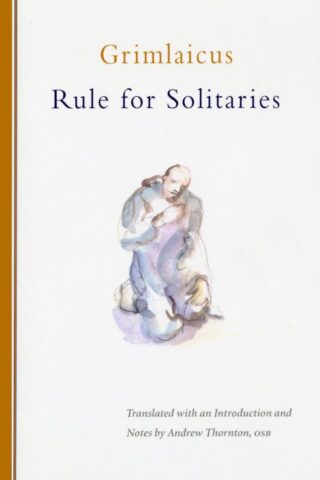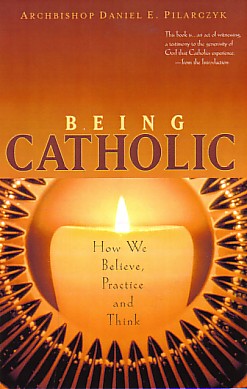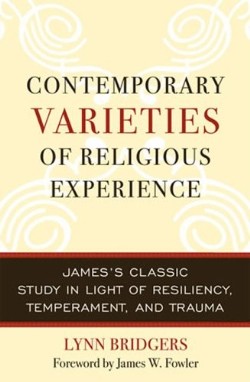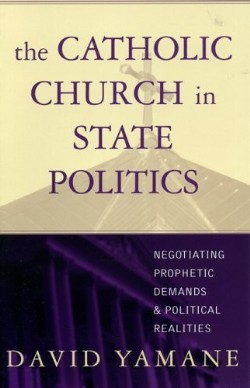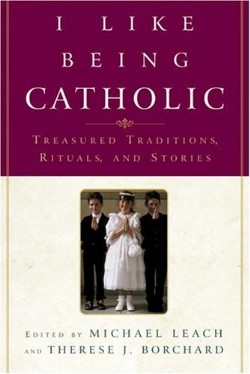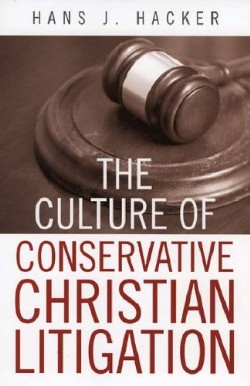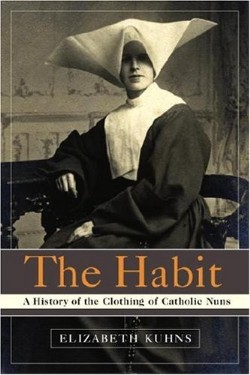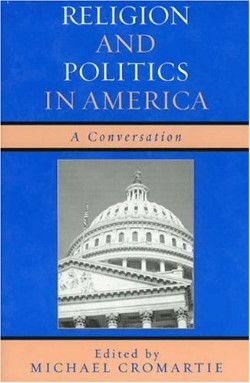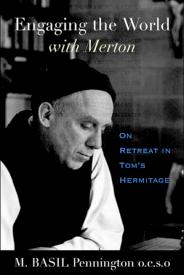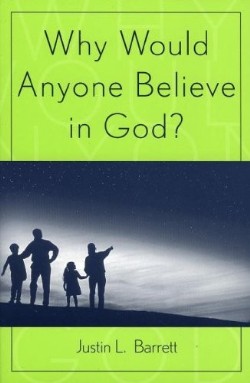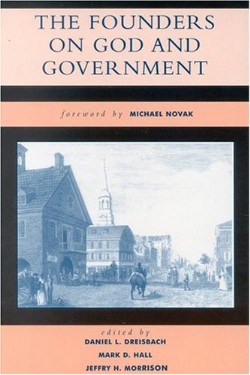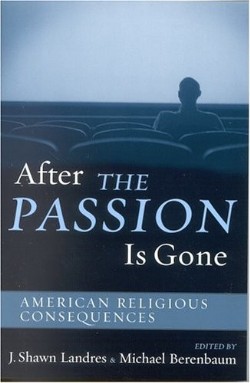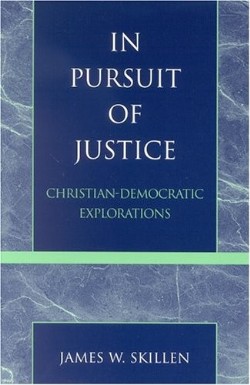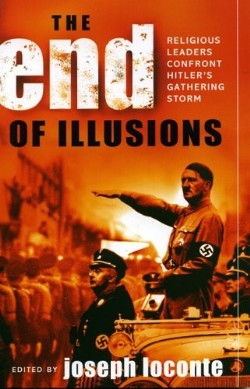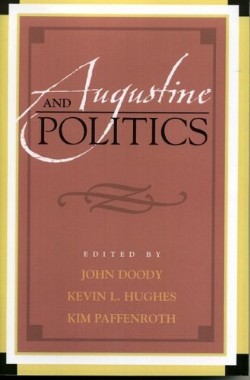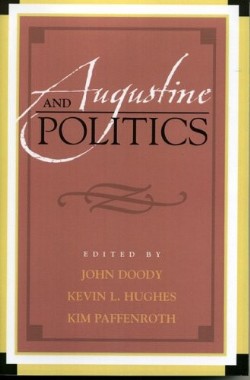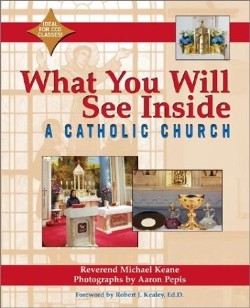Religion
Showing all 18 resultsSorted by latest
-
Catholicity Of Reason
$36.99Add to cartAn original argument for the recovery of a robust notion of reason and truth in response to modern rationalism and postmodern skepticism
The Catholicity of Reason explains the “grandeur of reason,” the recollection of which Benedict XVI has presented as one of the primary tasks in Christian engagement with the contemporary world.
While postmodern thinkers — religious and secular alike — have generally sought to respond to the hubris of Western thought by humbling our presumptuous claims to knowledge, D. C. Schindler shows in this book that only a robust confidence in reason can allow us to remain genuinely open both to God and to the deep mystery of things. Drawing from both contemporary and classical theologians and philosophers, Schindler explores the basic philosophical questions concerning truth, knowledge, and being — and proposes a new model for thinking about the relationship between faith and reason.
The reflections brought together in this book bring forth a dramatic conception of human knowing that both strengthens our trust in reason and opens our mind in faith.
-
Rule For Solitaries
$24.95Add to cartThe monk Grimlaicus (ca. 900) wrote a rule for those who, like himself, pursued the solitary life within a monastic community. Never leaving their cell yet participating in the liturgical life of the monastery through a window into the church, these “enclosed” sought to serve God alone. Beyond the details of horarium, reception of newcomers, diet, and clothing, Grimlaicus details practical measures for maintaining spiritual, psychological, and physical health, and for giving counsel to others. Scripture, the Rule of St. Benedict, and the teachings of early ecclesial and monastic writers form the kernel of Grimlaicus’s wise and balanced rule, presented here for the first time in English translation.
-
Being Catholic : How We Believe Practice And Think
$21.99Add to cartA bishop is not only a spiritual shepherd but a teacher. In this book the author teaches in clear, concise language the basic beliefs and practices of Catholics and what shapes a Catholic’s thinking. The book discusses:
How We Believe
How We Practice
How We Think -
Contemporary Varieties Of Religious Experience
$49.00Add to cartIntroduction
Evolution Of A Pluralist
James’s Conversion Typology
Prophets
Monks
Mystics
Between Me And My God
Additional Info
First published in 1902, William James’s Varieties of Religious Experience is considered a classic in religious studies and the psychology of religion. But how has James’s classic study weathered decades of development in psychology and behavioral sciences? Do the assertions about religious experience in the Varieties still ring true in light of neuro-cognitive and neuro-hormonal research, resiliency studies, studies of temperament, and traumatic studies? By extending William James’s own research throughout the century since its publication this volume seeks to answer those questions. In doing so, it revolutionizes our understanding of James’s own view of psychology and reveals the extraordinary value of James’s perspective for religion, psychology, and spirituality today. In doing so, it offers vital insights for pastoral care and faith development at both the individual and congregational level.From the Introduction by James Fowler:
Drawing on the authenticity of her own experience, Bridgers carries us into a remarkably clear and well documented account that traces William James’s evolution as a psychologist, philosopher, and a deeply engaged inquirer into the dynamics of spiritual development and transformation… This book has a major contribution to make. Bridgers’s study illumines the horizons of contemporary research in the study of religious experience, in all its varieties, and in the context of globalization.
-
Catholic Church In State Politics
$46.00Add to cartIntroduction: The Governor And The Archbishop
History: From John Carroll To The Maryland Catholic Conference
Organization: State Catholic Conferences As Dual Structures
Issues: The Seamless Garment In Action
Legitimacy: Political Influence And The Catholic Watergate
Discourse: Liberally Clothing The Naked Public Square
Conclusion: Catholic Political Advocacy In Secular Society: Future Challenges
Appendix
Additional Info
What role, if any, should religion play in politics? By what authority and methods does the Catholic Church apply its teachings to public policy discourse? How do Bishops and lay leaders work together in Catholic conferences, and how do they work with political leaders? What impact do they have?The political advocacy of the American Catholic Bishops at the state level is one of the Church’s best-kept secrets. In this groundbreaking work, David Yamane reveals the rich history, accomplishments, and challenges of bishops and their lay colleagues in local politics. Through sociological analysis, up-to-date examples, and personal interviews, Yamane explains how the local Catholic advocacy organizations in thirty-three states and Washington, D.C., negotiate the tension between the prophetic demands of faith and the political realities of secular political institutions. The Catholic Church in State Politics invites readers to understand better the role of religion in the public square.
-
I Like Being Catholic
$15.00Add to cartA celebration of the treasured traditions, rituals, and stories that run through the bloodstream of American Catholics
For Andrew Greeley, it is the reverence of Christmas night and the exultation of Easter morn. Martin Scorsese, like many others, remains grateful for the nuns who rapped his knuckles but built his self-esteem. Mary Gordon recalls the sense of lightness that follows confession; Vince Lombardi, the strength he derived from Mass; and Christopher Buckley, the role St. Thomas More plays in his writing.
I Like Being Catholic brings together the memories, thought, and hopes of famous Catholics and ordinary parishioners, lapsed and “good-enough” Catholics, and those who have devoted their lives to the faith. It captures their abiding ties to and deep affection for the Church and offers the wide-ranging, sometimes surprising views on the good things that come with being Catholic.
This is not a book of theology. It is about the beauty at the heart of Catholicism. It is about what Teilhard de Chardin called “the chosen part of things.” It is about family and community, the value of Catholic education, the significance of sacraments and milestones, and the cultural impact of Catholicism-there are lists of the ten best Catholic novels, the ten best Catholic movies, ten Catholic heroes of the twentieth century, ten good reasons to raise your kids Catholic, fifty things Catholics like best about being Catholic, and much more …
I Like Being Catholic is a book for all those who have ever called themselves Catholic. It is a book of warmth, affection, humor, and love.
-
Culture Of Conservative Christian Litigation
$55.00Add to cartPreface
The Culture Of Conservative Christian Litigation
A Place At The Table
Working For Equal Access
Wise As A Serpent And Innocent As A Lamb
Good Lawyers, Good Christians
Appendix: Table Of Cases
Additional Info
Over the past decade, conservative Christian public law firms have been some of the most active and aggressive litigators in the nation. Their efforts have impacted important policy areas including religion in the Public Square, school prayer, gay rights, ‘family values’ and abortion policy. But the Fundamentalist Christian/Evangelical social movement is not monolithic. In this probing and judicious work, Hacker explores and clarifies the influence of ideology on the goals and behavior of three leading conservative Christian law firms and how they differ in agendas and approach. He provides rich interview narratives that shed light on interest group behavior and how it is influenced by internal group characteristics. -
Habit : A History Of The Clothing Of The Catholic Nuns
$19.00Add to cartCuriosity about nuns and their distinctive clothing is almost as old as Catholicism itself. The habit intrigues the religious and the nonreligious alike, from medieval maidens to contemporary schoolboys, to feminists and other social critics. The first book to explore the symbolism of this attire, The Habit presents a visual gallery of the diverse forms of religious clothing and explains the principles and traditions that inspired them. More than just an eye-opening study of the symbolic significance of starched wimples, dark dresses, and flowing veils, The Habit is an incisive, engaging portrait of the roles nuns have and do play in the Catholic Church and in ministering to the needs of society.
From the clothing seen in an eleventh-century monastery to the garb worn by nuns on picket lines during the 1960s, habits have always been designed to convey a specific image or ideal. The habits of the Benedictines and the Dominicans, for example, were specifically created to distinguish women who consecrated their lives to God; other habits reflected the sisters’ desire to blend in among the people they served. The brown Carmelite habit was rarely seen outside the monastery wall, while the Flying Nun turned the white winged cornette of the Daughters of Charity into a universally recognized icon. And when many religious abandoned habits in the 1960s and ’70s, it stirred a debate that continues today.
Drawing on archival research and personal interviews with nuns all over the United States, Elizabeth Kuhns examines some of the gender and identity issues behind the controversy and brings to light the paradoxes the habit represents. For some, it epitomizes oppression and obsolescence; for others, it embodies the ultimate beauty and dignity of the vocation.
Complete with extraordinary photographs, including images of the nineteenth century nuns’ silk bonnets to the simple gray dresses of the Sisters of Social Service, this evocative narrative explores the timeless symbolism of the habit and traces its evolution as a visual reflection of the changes in society.
-
Religion And Politics In America
$49.00Add to cartIntroduction
Evangelicalism And American Life: A Conversation With Nathan Hatch, Grant Wacker, And Hanna Rosin
New Century, New Story-Line: Catholics In America: A Conversation With George Weigel And Kenneth L. Woodward
Can The Jews Survive America?: A Conversation With Jack Wertheimer And David Brooks
Does God Belong On The Stump?: A Conversation With Stephen Carter, Charles Krauthammer, And Leo Ribuffo
How The Faithful Voted: A Conversation With John C. Green And John DiIulio
How Should We Talk? Religion And Public Discourse: A Conversation With Jean Bethke Elshtain And William McGurn
The New Christian Right In Historical Context: A Conversation With Leo Ribuffo And David Shribman
The Rights And Wrongs Of Religion In Politics: A Conversation With Stephen Carter And Jeffrey Rosen
Discussion Participants
Index
Additional Info
As religiously grounded moral arguments have become ever more influential factors in the national debate-particularly reinforced by recent presidential elections and the creation of the faith-based initiative office in the White House-journalists’ ignorance about theological convictions has often worked to distort the public discourse on important policy issues. Pope John Paul II’s pronouncements on stem-cell research, the constitutional controversies regarding faith-based initiatives, the emerging participation of Muslims in American life-issues like these require political journalists in print and broadcast media to cover religious contexts that many admit they are ill-equipped to understand.Put differently, these news events reflect subtle theological nuances and deep faith commitments that shape the activities of religious believers in the public square. Inasmuch as a faith tradition is an active or significant participant in the public arena, journalists will need to better understand the theological sources and religious convictions that motivate this political activity.
The current national discourse has brought faith and its relationship to public policy to the forefront of our daily news. Since 1999, the Ethics and Public Policy Center, through the generosity of the Pew Charitable Trusts, has hosted six conferences for
national journalists to help raise the level of their reporting by increasing their understanding of religion, religious communities, and the religious convictions that inform the political activity of devout believers. This book contains the presentations and
conversations that grew out of those conferences
-
Engaging The World With Merton
$15.99Add to cartIn this engaging guide, M. Basil Pennington takes us on a retreat with Thomas Merton, in Merton’s own Kentucky hermitage, reading his writings on the spiritual life, praying the hours, caring for the birds on the front porch. This is the place where Merton found greater silence and solitude than was possible for him within the walls of the monastery. Pennington fills this eloquent introduction to Merton with photographs taken in and around the hermitage. Engaging the World with Merton enables each of us to have a retreat with Pennington’s friend and mentor as our companion, as we seek the kingdom of God within.
-
Why Would Anyone Believe In God
$40.00Add to cartPreface
What Does It Mean To “believe”?
Where Do Beliefs In Gods Come From? Religious Concepts As Minimally Counterintuitive
Where Do Beliefs In Gods Come From? Finding Agents Everywhere
Where Do Gods Come From? Additional Factors That Contribute To Gods’ Credibility
How Religious Actions Enhance Belief In Gods
The Naturalness Of Belief In God
The Naturalness Of Believing In Minds: An Analog For Understanding Belief In God
Why Would Anyone NOT Believe In God?
In Conclusion
Additional Info
Because of the design of our minds. That is Justin Barrett’s simple answer to the question of his title. With rich evidence from cognitive science but without technical language, psychologist Barrett shows that belief in God is an almost inevitable consequence of the kind of minds we have. Most of what we believe comes from mental tools working below our conscious awareness. And what we believe consciously is in large part driven by these unconscious beliefs. Barrett demonstrates that beliefs in gods match up well with these automatic assumptions; beliefs in an all-knowing, all-powerful God match up even better. Barrett goes on to explain why beliefs like religious beliefs are so widespread and why it is very difficult for our minds to think without them. Anyone who wants a concise, clear, and scientific explanation of why anyone would believe in God should pick up Barrett’s book. -
Founders On God And Government
$63.00Add to cartForeword: Religious Liberty
Michael Novak
PrefaceReligion And The Common Good: George Washington On Church And State
Vincent Philip Muoz
One Public Religion, Many Private Religions: John Adams And The 1780 Massachusetts Constitution
John Witte, Jr.
The Religious Rhetoric Of Thomas Jefferson
Thomas E. Buckley, S.J.
Religion And Politics In The Thought Of James Madison
Garrett Ward Sheldon
John Witherspoon’s Revolutionary Religion
Jeffry H. Morrison
Benjamin Franklin And The Role Of Religion In Governing Democracy
Howard L. Lubert
James Wilson: Presbyterian, Anglican, Thomist, Or Deist? Does It Matter?
Mark D. Hall
George Mason’s Pursuit Of Religious Liberty In Revolutionary Virginia
Daniel L. Dreisbach
Catholic Politics And Religious Liberty In America: The Carrolls Of Maryland
James R. Stoner
Afterword: Revolutionary-Era Americans: Were They Enlightened Or Protestant? Does It Matter?
Barry Alan Shain
BibliographyAdditional Info
In God We Trust?” The separation of church and state is a widely contested topic in the American political arena. Whether for or against, debaters frequently base their arguments in the Constitution and the principles of the American founding. However, Americans’ perception of the founding has narrowed greatly over the years, focusing on a handful of eminent statesmen.By exploring the work of nine founding fathers, including often overlooked figures like John Carroll and George Mason, The Founders on God and Government provides a more complete picture of America’s origins. The contributors, all noted scholars, examine the lives of individual founders and investigate the relationship between their religious beliefs and political thought. Bringing together original documents and analytical essays, this book is an excellent addition to the library of literature on the founding, and sheds new light on religion’s contributions to American civic culture.
-
After The Passion Is Gone
$50.00Add to cartIntroduction
J. Shawn Landres And Michael Berenbaum
Part One: The Context Of The PassionIntroduction To Part One
Almost A Culture War: The Making Of The Passion Controversy
Mark Silk (Trinity College)
Passionate Blogging: Interfaith Controversy And The Internet
William J. Cork (Catholic Diocese Of Galveston-Houston)
Living In The World, But Not Of The World: Understanding Evangelical Support For The Passion Of The Christ
Leslie Smith (UCSB)
The Passion Paradox: Signposts On The Road Toward Mormon Protestantization
Eric Samuelsen (BYU)
Is It Finished? The Passion Of The Christ And The Fault Lines In American Christianity
Julie Ingersoll (University Of North Florida)
Part Two: The Passion In ContextIntroduction To Part Two
The Journey Of The Passion Play From Medieval Piety To Contemporary Spirituality
Karen Jo Torjesen (Claremont Graduate University)
The Gibson Code?
Lorenzo Albacete (St. Joseph Seminary, Yonkers)
“But Is It Art?”: A Prelude To Criticism Of Mel Gibson’s The Passion Of The Christ
Robert A. Faggen (Claremont McKenna College)
Antisemitism Without Erasure: Sacred Texts And Their Contemporary Interpretations
Gary L. Gilbert (Claremont McKenna College)
Theologizing The Death Of Jesus, Gibson’s The Passion, And Christian Identity
Jeffrey S. Siker (Loyola Marymount University)
Manly Pain And Motherly Love: Mel Gibson’s Big Picture
David Morgan (Valparaiso University)
Imago Christi: Aesthetic And Theological Issues In Jesus Films By Pasolini, Scorsese, And Gibson
Lloyd Baugh, SJ (Pontifical Gregorian University, Rome)
Part Three: Jews And Christians: Reframing The DialogueIntroduction To Part Three
Theological Bulimia: Christianity And Its Dejudaization
Susannah Heschel (Dartmouth College)
A March Of Passion, Or, How I Came To Terms With A Film I Wasn’t Supposed To Like
Stephen R. Haynes (Rhodes College)
The Exposed Fault Line
Richard L. Rubenstein (University Of Bridgeport)
Crucifying Jesus: Antisemitism And The Passion Story
Stephen T. Davis (Claremont McKenna College)
Five Introspective Challenges
David M. Elcott (American Jewish Committee)
No Crucifixion = No Holocaust: Post-Holocaust Reflections On The Passion Of The Christ
John K. Roth (Claremont McKenna College)
The Passionate Encounter: The Ethics Of Affirming Your Faith In A Multi-Religious World
Elliot N. Dorff (University Of Judaism)
Reframing Difference: Evangelicals, Scripture, AnAdditional Info
Mel Gibson’s The Passion of the Christ topped box office charts and changed the American religious conversation. The controversies it raised remain unsettled. In After The Passion Is Gone: American Religious Consequences, leading scholars of religion and theology ask what Gibson’s film and the resulting controversy reveal about Christians, Jews, and the possibilities of interreligious dialogue in the United States. Landres and Berenbaum’s collection moves beyond questions of whether or not the film was faithful to the gospels, too violent, or antisemitic and explores why the debate focused on these issues but not others. The public discussion of The Passion shed light on a wide range of American attitudes–evangelical Protestant, mainline Protestant, Roman Catholic, and Jewish–about media and faith, politics and history, Jesus and Judaism, fundamentalism and victimhood. After The Passion Is Gone takes a unique view of vital points in Christian-Jewish relations and contemporary American religion -
In Pursuit Of Justice
$50.00Add to cartWhat Distinguishes A Christian-Democratic Point Of View?
Civil Society And Human Development
The Question Of Being Human
E Pluribus Unum And Faith-Based Welfare Reform
The Cause Of Racial Justice
Equal Education For All
Liberalism And The Environment
Citizenship And Electoral Reform
Additional Info
This is a series of eight essays on diverse public policy concerns that asks the questions: What does racial justice, or environmental protection, or family policy look like when approached from a Christian-democratic perspective? And what about the civil-society questions of welfare, education, and political participation? The author, James W. Skillen, argues that the roots of a Christian-democratic approach are neither liberal nor conservative, but pluralistic, opening the way to a healthy regard for both social complexity and government’s responsibility to uphold political community.Published in cooperation with the Center for Public Justice
-
End Of Illusions
$53.00Add to cartI The Peacemakers
A Road Away From War
Albert W. Palmer
Putting Christianity In Cold Storage
Albert W. Palmer
On Saving Civilization
Charles Clayton Morrison
What Can America Do For Peace?
Charles Clayton Morrison
A War For Imperialism
Charles Clayton Morrison
The Same Old War
John Haynes Holmes
The Causes Of War–Hitler
John Haynes Holmes
Nazi Atrocities And The American War Fever
Paul L. Blakely
All Will Be Lost By War
Paul L. Blakely
A Clash Of Imperialisms
Ernest Fremon Tittle
What Can Christians Do?
Georgia Harkness
What, Then, Should Churches Do?
Georgia Harkness
Keeping Christ Above The Strife
Harry Emerson Fosdick
II The ProphetsAn End To Illusions
Reinhold Niebuhr
Why The Church Is Not Pacifist
Reinhold Niebuhr
Christian Faith And The World Crisis
Reinhold Niebuhr
First Letter To The French Protestants
Karl Barth
Second Letter To The French Protestants
Karl Barth
A Letter To Great Britain
Karl Barth
Five Mournful Years For Jewry
Stephen S. Wise
Enemy Of Human Freedom
Stephen S. Wise
The Crime Of Crimes
Stephen S. Wise
The Darkest Political Tyranny
John Bennett
Irresponsible Idealism
Henry P. Van Dusen
The Christian As Citizen
Henry P. Van Dusen
Defending Justice Despite Our Own Injustice
Lynn Harold Hough
The Barbarian Alternative
Lewis Mumford
The Aftermath Of Utopianism
Lewis Mumford
III The Gathering StormWar And Peace
America’s Responsibility In The Present Crisis
Additional Info
The rise of Islamic radicalism has led to heated discussions about how best to address the threat of religious terror. Disputes covering the right and wrong of war with Iraq, and the even bigger war on terrorism, continue to rage across America. But this is not the first argument of this nature–America was faced with a similar moral dilemma on the eve of World War II. Fascism was conquering Europe, and religious leaders across the nation vehemently debated how to confront Nazi Germany.In The End of Illusions: Religious Leaders Confront Hitler’s Gathering Storm, Joseph Loconte brings together pieces from the most significant religious thinkers of the pre-war period. In these essays, the writers eloquently and passionately present their arguments for going to war or maintaining the peace. In doing so, they explore issues vibrantly relevant today, including the Christian cause for war, the problem of evil, and America’s role in the world. These urgently written pieces connect the past with the present and resonate with renewed clarity and poignancy
-
Augustine And Politics
$54.99Add to cartDedicatory Preface
Thomas F. Martin O.S.A.
Introduction
John Doody, Kevin L. Hughes, And Kim Paffenroth
Human Nature And Virtue In Relation To PoliticsUnited Inwardly By Love: Augustine’s Social Ontology
Phillip Cary
Truthfulness As The Bond Of Society
Robert P. Kennedy
Friendship As Personal, Social, And Theological Virtue In Augustine
Kim Paffenroth
Freedom Beyond Our Choosing: Augustine On The Will And Its Objects
David C. Schindler
Augustine’s Theory And Critique Of PoliticsBetween The Two Cities: Political Action In Augustine Of Hippo
Robert Dodaro O.S.A.
Democracy And Its Demons
Michael Hanby
Local Politics: The Political Place Of The Household In Augustine’s City Of God
Kevin L. Hughes
Augustine And The Politics Of Monasticism
Thomas F. Martin O.S.A.
The Glory And Tragedy Of Politics
Thomas W. Smith
Augustinian Influence And PerspectivesToward A Contemporary Augustinian Understanding Of Politics
Todd Breyfogle
Sexual Purity, “the Faithful,” And Religious Reform In Eleventh-Century Italy: Donatism Revisited
Louis I. Hamilton
The Enchanted City Of Man: The State And The Market In Augustinian Perspective
Eugene McCarraher
Machiavelli’s City Of God: Civic Humanism And Augustinian Terror
Paul WrightAdditional Info
The study of Augustine’s political teachings has suffered from a history of misreadings, both ancient and modern. It is only in recent years that the traditional lines of “Augustinian pessimism” have been opened to question. Scholars have begun to explore the broader lines of Augustine’s political thought in his letters and sermons, and thus have been able to place his classic text, The City of God, in its proper context. The essays in this volume take stock of these recent developments and revisit old assumptions about the significance of Augustine of Hippo for political thought. They do so from many different perspectives, examining the anthropological and theological underpinnings of Augustine’s thought, his critique of politics, his development of his own political thought, and some of the later manifestations or uses of his thought in the Middle Ages, the Renaissance, and today. This new vision is at once more bracing, more hopeful, and more diverse than earlier readings could have allowed. -
Augustine And Politics
$140.00Add to cartDedicatory Preface
Thomas F. Martin O.S.A.
Introduction
John Doody, Kevin L. Hughes, And Kim Paffenroth
Human Nature And Virtue In Relation To PoliticsUnited Inwardly By Love: Augustine’s Social Ontology
Phillip Cary
Truthfulness As The Bond Of Society
Robert P. Kennedy
Friendship As Personal, Social, And Theological Virtue In Augustine
Kim Paffenroth
Freedom Beyond Our Choosing: Augustine On The Will And Its Objects
David C. Schindler
Augustine’s Theory And Critique Of PoliticsBetween The Two Cities: Political Action In Augustine Of Hippo
Robert Dodaro O.S.A.
Democracy And Its Demons
Michael Hanby
Local Politics: The Political Place Of The Household In Augustine’s City Of God
Kevin L. Hughes
Augustine And The Politics Of Monasticism
Thomas F. Martin O.S.A.
The Glory And Tragedy Of Politics
Thomas W. Smith
Augustinian Influence And PerspectivesToward A Contemporary Augustinian Understanding Of Politics
Todd Breyfogle
Sexual Purity, “the Faithful,” And Religious Reform In Eleventh-Century Italy: Donatism Revisited
Louis I. Hamilton
The Enchanted City Of Man: The State And The Market In Augustinian Perspective
Eugene McCarraher
Machiavelli’s City Of God: Civic Humanism And Augustinian Terror
Paul WrightAdditional Info
The study of Augustine’s political teachings has suffered from a history of misreadings, both ancient and modern. It is only in recent years that the traditional lines of “Augustinian pessimism” have been opened to question. Scholars have begun to explore the broader lines of Augustine’s political thought in his letters and sermons, and thus have been able to place his classic text, The City of God, in its proper context. The essays in this volume take stock of these recent developments and revisit old assumptions about the significance of Augustine of Hippo for political thought. They do so from many different perspectives, examining the anthropological and theological underpinnings of Augustine’s thought, his critique of politics, his development of his own political thought, and some of the later manifestations or uses of his thought in the Middle Ages, the Renaissance, and today. This new vision is at once more bracing, more hopeful, and more diverse than earlier readings could have allowed. -
What You Will See Inside
$24.99Add to cartVisual and informative, What You Will See Inside a Catholic Church features full-page pictures and concise descriptions of what is happening, the objects used, the clergy and laypeople who have specific roles, and the spiritual intent of believers. Ideal for teachers, parents, librarians, clergy, and lay leaders who work with children ages 6 to 10.

